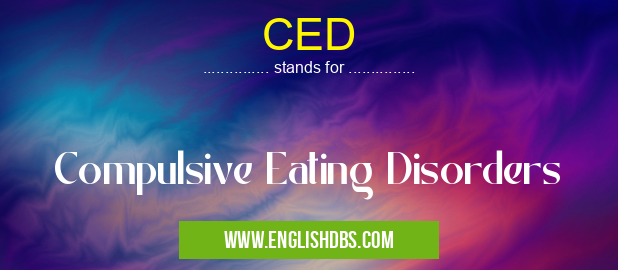What does CED mean in MEDICAL
Compulsive Eating Disorders (CED) is a broad and general term used to describe the presence of severe, persistent and unmanageable eating behavior. It is commonly associated with binge eating disorder, bulimia nervosa, or compulsive overeating and encompasses both a physical and psychological disorder. CED affects individuals of all ages, genders, socio-economic backgrounds and can be life-threatening if left untreated.

CED meaning in Medical in Medical
CED mostly used in an acronym Medical in Category Medical that means Compulsive Eating Disorders
Shorthand: CED,
Full Form: Compulsive Eating Disorders
For more information of "Compulsive Eating Disorders", see the section below.
Meaning
Compulsive Eating Disorder includes any abnormal patterns of food consumption that are notably more than what would be considered normal for an individual’s age and weight. It typically involves frequent episodes of eating substantially more food than most people would eat in a similar period of time under similar circumstances. These episodes are often accompanied by feelings of guilt or shame afterwards due to the excessive amount of food consumed. Compulsive Eating Disorder can lead to serious health problems including nutritional deficiencies, sleep disturbances, gastrointestinal issues, depression and anxiety disorders in addition to extreme fluctuations in weight gain or loss.
Causes
The exact cause of CED remains unknown; however, research suggests that underlying factors may include biological (changes in serotonin levels), genetic predisposition (family history), as well as environmental influences such as dieting or stressful life events. Many believe that CED is an emotional coping mechanism used to deal with stress or difficult emotions which leads them to seeking comfort from food rather than using healthier alternatives such as exercise or talking to someone about their feelings.
Diagnosis
CED is typically diagnosed based on an individual’s reported behaviors and symptoms. Though there are no set diagnostic criteria for diagnosing CED specifically; however professionals with specialize knowledge in the field may use symptom criteria based on other diagnoses related to disordered eating patterns (e.g., binge eating). Furthermore, medical tests may be recommended such as blood tests or imaging studies to determine any underlying medical conditions which could be contributing factors.
Treatment
Effective treatment for Compulsive Eating Disorders requires a comprehensive approach involving nutrition education, counseling and lifestyle modifications such as increasing physical activity levels and implementing healthy coping mechanisms like mindful meditation techniques. Psychotherapy sessions can also help individuals better understand their condition and learn how to manage it more effectively while addressing any underlying emotions driving their compulsive behavior around food.
Essential Questions and Answers on Compulsive Eating Disorders in "MEDICAL»MEDICAL"
What is Compulsive Eating Disorders?
Compulsive Eating Disorders (CED) is an eating disorder characterized by cycles of binging and purging or restricting food intake to the point where it becomes hazardous to one’s health. It can be accompanied by a wide range of physical and emotional symptoms, including depression, anxiety, fear of gaining weight, and a distorted body image.
What are the causes of CED?
CED is linked to a number of factors including genetics, environment, psychological trauma, and social pressures. It is important to note that compulsive eating disorders do not indicate an individual's lack of willpower or character.
How does compulsive overeating manifest itself?
Individuals with CED may engage in behaviors such as binging on large amounts of food in a short period of time followed by extreme dieting or fasting. Additionally, they may practice self-induced vomiting after eating or take laxatives in order to control their weight.
What are risk factors for developing CED?
A person’s risk for developing CED increases if they have a family history of disordered eating or psychological issues such as depression, low-self esteem, and anxiety. Other factors that increase the chances for developing CED include bullying or teasing about weight and shape; feeling disconnected from other people; media pressures; or cultural ideals about beauty and size.
How do I know if I have CED?
If you feel like you are bingeing on food regularly; using unhealthy methods such as vomiting after eating to manage your weight; overly restrictive diets; having intense fear regarding gaining weight; avoiding activities due to appearance/weight concerns then it might be time to consider seeking professional help from a mental health specialist who specializes in CED treatment.
Are there any treatments available for Compulsive Eating Disorders?
Yes! Many treatments exist specifically designed to address the underlying causes of Compulsive Eating Disorders, and these can be tailored depending on each individual’s needs and lifestyle. These treatments typically include cognitive behavioral therapy (CBT), dialectical behavioral therapy (DBT), psychoeducation, nutrition education as well as individual counseling sessions with trained professionals specializing in mental health care.
Who should I contact if I think I am at risk for developing compulsive eating disorder?
If you think you may be at risk for compulsive eating disorder then we strongly recommend discussing your concerns with your primary medical provider who can assess you further and determine whether referral to an appropriate specialist would be beneficial for your specific situation.
Is there support for individuals suffering from CED?
There are many different types of support available for individuals suffering from Compulsive Eating Disorder such as support groups provided either online or through private organizations as well as self-help books available for purchase online. Additionally there are many resources available through professional organizations dedicated to providing assistance specifically related to mental health disorders including CED.
Final Words:
Compulsive Eating Disorders are serious but treatable conditions that require professional intervention in order to successfully cope with the consequences both physically and emotionally associated with this condition. With proper diagnosis and treatment plan tailored specifically to each person’s needs, full recovery from CED is possible.
CED also stands for: |
|
| All stands for CED |
